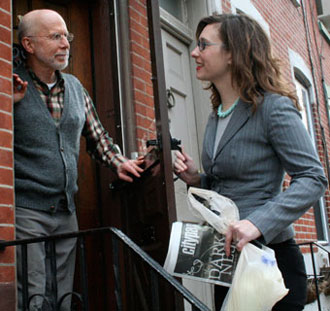Maxwell Perspective: Ageless
July 12, 2012
Related:
From Maxwell Perspective...
Ageless
Kate Clark is working to make Philadelphia more liveable for its growing senior citizen population — to the benefit of all.

Kate Clark (right) works to make Philadelphia as senior-friendly as possible.
Kate Clark ’05 MPA didn’t realize what a “Peter Pan city” was until she became a mother. Pushing a stroller, she experiences Philadelphia as a senior might. “When I go to the park, I want clean bathrooms,” says Clark. “When I’m on a sidewalk, I don’t want obstacles. When I’m at a bus stop, I want shelter.”
A Peter Pan city — one designed only for the sprightly — is what Clark is working to prevent. She’s a planner for the nonprofit Philadelphia Corporation for Aging (PCA), and co-founder and chair of GenPhilly, a network of young professionals working on aging issues.
Of America’s 10 largest cities, Philadelphia has the highest proportion of older adults, with 19 percent of its residents 60 or older. The “silver tsunami” of aging Baby Boomers means the needs of seniors — relating to poverty, health, housing, and disability — will climb. According to a PCA study, Philly will experience a surge of 85-and-older citizens within five years.
A city’s resources could be strained by an aging population requiring emergency assistance, health care, and transportation services. However, by considering senior needs in planning, a city can make housing, parks, streets, and transportation age-friendly. It’s good public management, saving money on intervention services. “I don’t think Philadelphia failed to plan for the silver tsunami,” says Clark. “Age-friendly initiatives were in place, but they needed focus.”
PCA has served as Philadelphia’s “area agency on aging” since 1973, providing services and programs to keep seniors independent and healthy. Recently, it developed “Age-Friendly Philadelphia,” an award-winning plan to spruce up parks, build bus shelters, repair sidewalks, plant gardens, and improve environments in which seniors live. In response, Philadelphia’s zoning code is being redesigned, and PCA has called for it to include a quota of requirements for senior-friendly housing.
“What’s good for older people is good for everybody.”
— Kate Clark Clark
also chairs GenPhilly, an effort to link the city’s creative class to its
seniors and to keep age-friendly issues on the agendas of other organizations.
“Age-friendly and youth-oriented initiatives are complementary,” she notes.
“What’s good for older people is good for everybody.”
GenPhilly taps into Clark’s experience as Syracuse’s first public arts coordinator, where she helped attract and retain young artists and musicians to disinvested inner city zones.
GenPhilly is now a 250-strong volunteer group — organizing workshops on pet ownership and music making, for example — that also seeks to capitalize on seniors’ potential to enrich a community. “The elderly look after neighborhoods, acting as eyes and ears and caring for children,” Clark explains. “They also help the young re-discover skills such as gardening, canning, and DIY.”
But is canning jelly cool enough for Philadelphia’s youth? Last year, GenPhilly made a presentation at IgnitePhilly, an arts-oriented festival where ideas are presented in lightning-fast segments. This was a real test of whether Philly’s hip population could be engaged in an age-friendly initiative. “We thought we’d flop,” says Clark, “but everybody loved GenPhilly!”
— Martin Walls